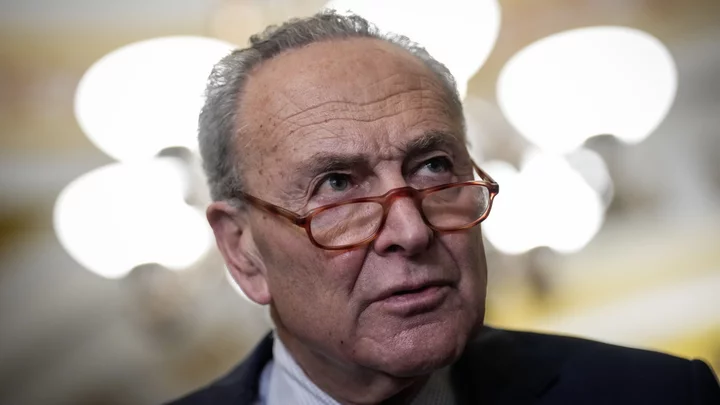Senate Majority Leader Chuck Schumer (D.-N.Y.) had a few things to say Thursday morning about what the federal government should be doing to tame AI, but first he had to wait through an uncanny opening act: AI versions of himself.
At a half-day conference hosted by The Washington Post, the senator watched as Post tech columnist Geoffrey Fowler displayed AI-generated images of Schumer aboard the International Space Station, on the surface of Mars, and surrounded by kittens. Then Fowler played an audio clip built using ElevenLabs’ voice-cloning technology in which a convincing rendition of Schumer endorsed fellow New Yorker Spider-Man for President, followed by another in which AI Schumer did the same in Spanish.
IRL Schumer then took the stage, saying “I am the real Chuck Schumer–I promise,” before making a case for government action to direct AI’s possibilities.
“If we don’t have government-imposed guardrails, the lowest common denominator will prevail,” he told his onstage interviewer, Washington Post Live anchor Leigh Ann Caldwell. But a federal role might also extend to investing in either opening AI-training databases to more companies or even in creating them directly: “You need real involvement, federal involvement.”
But that government role can’t result in the US becoming a trailing indicator of AI development, Schumer continued. “China is moving very fast here,” he said. “They're investing lots of money, and they're doing it in a different way. They don't have the same kind of values that we have.”
Citing the longstanding and widespread use of facial-recognition technology in China for both public and private purposes, Schumer said that’s not a future we should want: “If we don't move forward, it will lead to not only a different dominant system of AI with different values, but we'll fall behind economically.”
But the Senator wasn’t ready to sketch out what those government guardrails might look like. The one concept he got into was “explainability,” the idea that an AI system should be able to document the inputs and processes that led to its output.
“Where did that picture of Chuck Schumer come from? Why did he say this? And where did that come from?” he asked. “If we can really discover, figure out how explainability can be accessible to the average user, you can have major success in creating guardrails and giving the consumer great information as to what they need.”
Noting support for some sort of regulation not only among his colleagues but among tech-industry veterans, Schumer said Congress should be able to advance at a deliberate speed between what he called the too-fast pace of EU regulation and the usual Congressional tech-policy pattern of press releases followed by inactivity.
“It's not going to be days or weeks before we put out proposals,” he said. “But it's not going to be years either.”
A more limited set of rules should land next week: Wednesday, the Post reported that on Monday, the Biden administration will publish an executive order imposing standards on companies seeking to sell AI systems to government customers. It's a power-of-the-purse strategy the White House has already used to try to raise cybersecurity standards–and reducing immigration barriers for high-skilled tech workers.
Another speaker at the Post’s event, White House Office of Science and Technology Policy director Arati Prabhakar, pointed to one model for this upcoming AI EO: the voluntary agreement 15 tech firms announced with the White House in July in which they committed to independent security testing of their systems before release and to develop robust watermarks identifying AI-generated content.
She also echoed Schumer’s warning about the risks of letting China define the AI future for the rest of the world: “One thing everyone agrees on is we do not want to live in that future that is shaped by technologies that have been driven by authoritarian regimes.”









